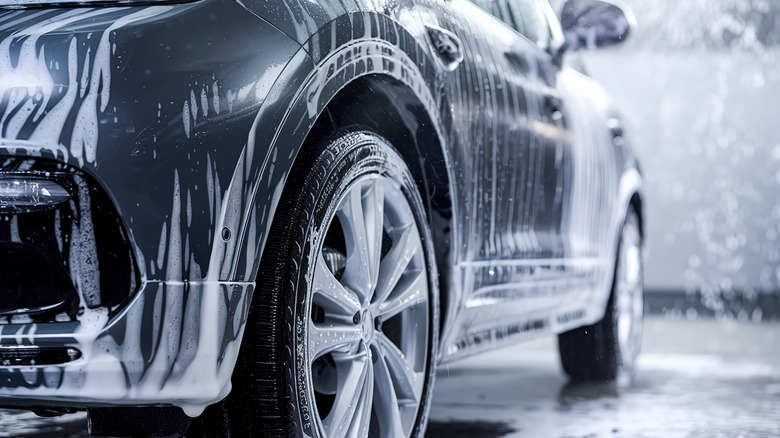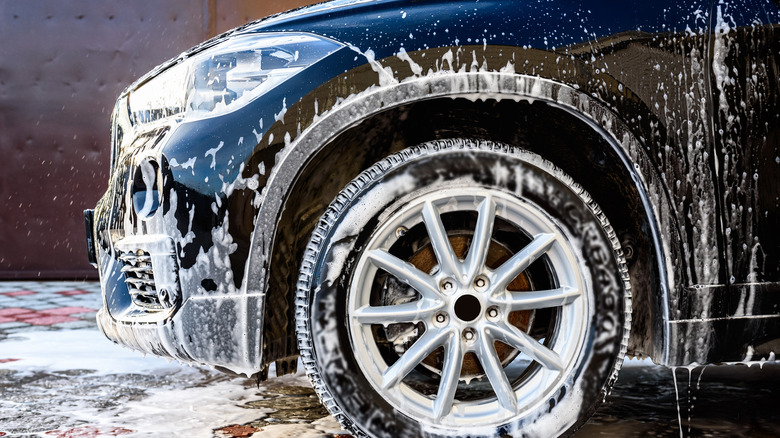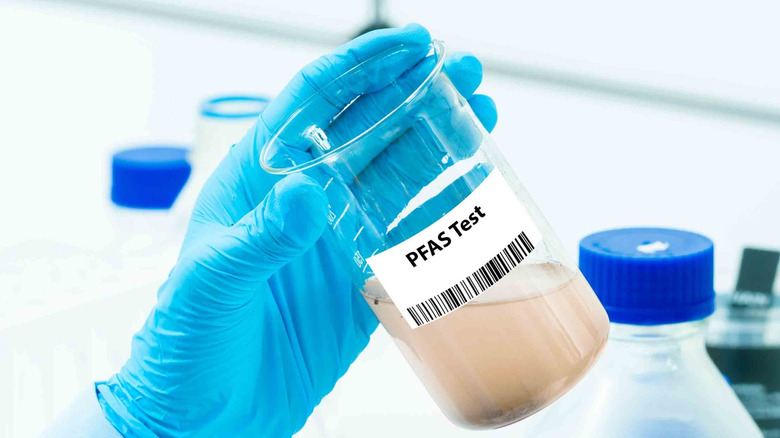The Hidden Danger Of Car Washes You Might Not Be Aware Of
There are a lot of benefits to keeping your car clean. Aside from the fact that it looks nicer, regular car washing protects the vehicle's paint and finish, helps prevent rust, and improves visibility by removing build-up from the windows, mirrors, and headlights. One of the easiest ways to keep your car clean is to take it through your local car wash, as you can simply wait a few minutes on the conveyor belt and your vehicle comes out the other side with a bright and shiny exterior.
While getting a few car cleaning tools for your garage and hand washing can be a more thorough and cheaper method, the convenience of a car wash service is tough to beat for others. Car washes may seem benign, but there may be more danger associated with them than you think. Consumer advocacy organization PIRG is warning that PFAS chemicals may be found at car washes. These chemicals don't do any harm to the car itself, but they can pose serious health risks to humans. What's more, these PFAS chemicals may not just be dangerous to you and the operators of the car wash, but they may also spillover into the rest of the community.
PFAS might be used in some car wash products
Per- and polyfluoroalkyl substances (PFAS) are a collection of over 9,000 compounds that have been in circulation since the 1940s, commonly referred to as "forever chemicals." This is because they are exceptionally long-lasting and break down incredibly slowly. At this point, PFAS chemicals have been detected in people and animals' blood all over the world, as well as in food products.
Once shed from their original sources, these substances are commonly carried in water, making it easy for them to contaminate the soil and even get into municipal water supplies. This is a problem because PFAS have been linked to several harmful health effects, such as decreased fertility, developmental delays in children, increased risk of some cancers, and more. Unfortunately, it seems that they may also be found at many car washes.
According to the Pollution Preservation Resource Center, "There are at least three cases of municipalities around the country detecting PFAS contamination in groundwater wells on or near a car wash facility." This might not seem like enough to indict car washes outright, but it certainly raises some eyebrows. Meanwhile, PIRG states that, "Available evidence suggests that PFAS chemicals may be found in at least some car waxes or polishes, which, unsurprisingly, are valued for their ability to shed water and provide a glossy finish."
PFAS runoff can contaminate waste and groundwater
According to PIRG, the excess PFAS found in the waxes and coatings from these car wash facilities doesn't necessarily stay at the business. They can also be carried and spread by water running off the cars after they're washed. PFAS that blend with dirt or grease on the car might wash away, and as the water carries this PFAS chemical-contaminated mixture to the ground, it can potentially permeate groundwater systems, per PIRG.
The Safe Drinking Water Act requires the EPA to monitor the use of PFAS chemicals and their potential to contaminate drinking water, along with any other contaminants that may cause a public health concern. In 2024, the agency announced regulations that put a cap on the amount of PFAS chemicals allowed to be in drinking water, but public water systems have some time to adjust and comply.
PIRG recommends that frequent car wash customers who are concerned that their car wash or auto shop products contain PFAS skip extra shines and wax treatments that might serve as vector for these contaminants. You can also ask local officials to test your town's water and drainage systems. Of course, you can also wash your own car, following some simple tricks and tips to get it ultra-clean, and choosing some alternatives to car wash soap that you can ensure do not contain PFAS.


